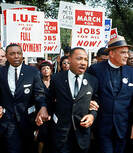weekly column
|
Each week, find a commentary on something connected to verses of Torah or another source of wisdom
|
|
Each week, find a commentary on something connected to verses of Torah or another source of wisdom
|
 Wisdom Wherever You Find It So often we overlook the work and the significance of those who are not in professional jobs. But let me say to you tonight that whenever you are engaged in work that serves humanity, it has dignity, and it has worth…All labor has worth. Dr. Martin Luther King, Jr. Eric Hoffer was a longshoreman during the middle of the last century. He grew up in a hardscrabble existence, orphaned, itinerant, and impoverished. Early in his life he recovered somewhat unexpectedly from an injury that took most of his vision, and to protect the return of his eyesight, he read. A lot. And then he began to write. Eventually, as a brief biography notes, “he left the docks in 1964, and shortly after became an adjunct professor at the University of California, Berkeley.” Longshoremen, of course, are the guys who unload cargo from ships at the docks. These days, they are the heroes who are working to overcome the bottleneck in the supply chain that is part of our economic upheaval during the pandemic. Most people remember Hoffer for his philosophical writings, including his seminal work, The True Believer. But his career before and after UCB was just as honorable. All labor has worth. A generation ago, I had an argument with a friend who worked in the White House persuading Congress to reconfigure public assistance. The proposal was to enhance the incentives for recipients to work. I charged in with my belief that it was just a way to save money on welfare expenditures. My friend insisted otherwise. He made the point that in our society, there was dignity in productivity. People would be lifted up, by others and by themselves, if they were working. Society had a responsibility not only to support them, but to encourage them. All labor has worth. Of course, the notion has been abused, as most good ideas can be. The gates to Auschwitz celebrated the liberating power of physical work. The Khmer Rouge consider anyone who worked with their mind instead of their hands to be parasitic. The missing ingredient was serving humanity, all of humanity. But in these last years of quarantine and isolation, we have come to understand the value of the efforts of people we have belatedly termed “essential workers.” Delivery people, trash collectors, shelf stockers, truck drivers, longshoremen – these are the people who, at some personal peril, have made it possible for so many of us to adjust to the current reality. While doctors, lawyers, academics, artists, and clergy, to name a few, remain celebrated for their accomplishments and devotion, the rediscovery of what was not so long ago the consensus about the dignity of workers is more than nostalgia. It is affirmation of a truth. All labor has worth. King’s words were spoken shortly before he was assassinated. While most people associate his last speeches with the lofty sentiments about the Promised Land – “I may not get there with you” – because they seemed tragically prophetic, too often we overlook that they were spoken on behalf of striking sanitation workers in Memphis. More than fifty years before we returned the designation “essential workers,” this hero of human dignity and civil rights was reminding the men who were often used as cautionary examples for affluent families that their job had dignity. All labor has worth. With understandable impatience, we are hearing from rights activists that they are tired of hearing people merely echo Dr. King’s words. It is long past time for action, they insist. Part of that effort is the emphasis on securing voting rights for all citizens, demolishing the obstacles historical and recent that disadvantage segments of the population when they try to exercise the franchise. But that’s not the only kind of action we can take. Every one of us can treat the workers we know better – you never want to be the worst part of someone else’s job, as Rabbi Eric Solomon says. For all of the controversy, labor unions remain the most effect means of ensuring collective rights for workers; they should be held to account, but never opposed. An honest week’s work should result in an honest week’s pay; it should take only one full-time job to support a family. And until that’s the standard in the land, that little extra self-taxation we call a tip should be considered a moral obligation. Not every longshoreman can be a philosopher. And not every philosopher can be a longshoreman. But whenever you are engaged in work that serves humanity, it has dignity, and it has worth. All labor has worth.
1 Comment
Samuel Press
1/17/2022 06:30:53 am
Jack-Again I gain much from you. May I receive your columns?
Reply
Leave a Reply. |
Archives
October 2023
Categories |